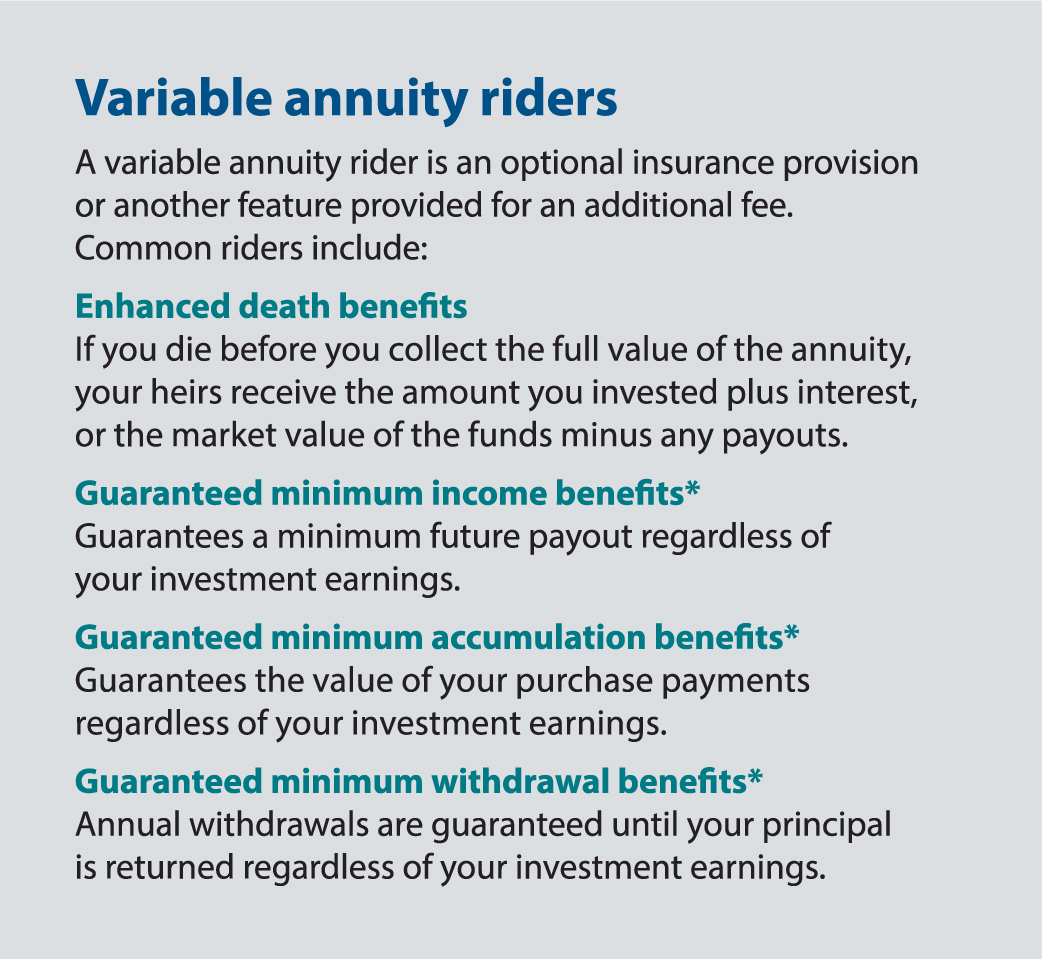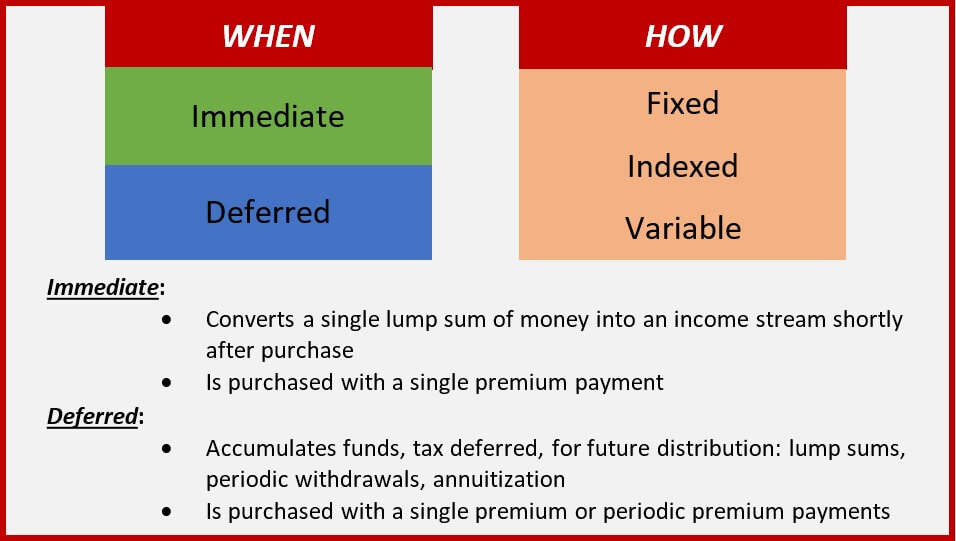Featured
Table of Contents
With a variable annuity, the insurer spends in a profile of mutual funds chosen by the customer. The performance of those funds will certainly determine how the account grows and just how huge a payment the buyer will ultimately obtain. Individuals that select variable annuities want to handle some degree of risk in the hope of generating larger profits.
If an annuity buyer is married, they can choose an annuity that will continue to pay revenue to their spouse must they die first. Annuities' payments can be either prompt or postponed. The standard concern you need to think about is whether you desire regular revenue currently or at some future date.
A deferred repayment enables the cash in the account more time to expand. And a lot like a 401(k) or an private retired life account (INDIVIDUAL RETIREMENT ACCOUNT), the annuity continues to accumulate incomes tax-free up until the cash is withdrawn. With time, that can develop up into a considerable amount and result in larger repayments.
With an immediate annuity, the payments begin as soon as the customer makes a lump-sum payment to the insurance provider. There are a few other important choices to make in acquiring an annuity, depending on your situations. These consist of the following: Buyers can schedule repayments for 10 or 15 years, or for the rest of their life.
Understanding Fixed Income Annuity Vs Variable Growth Annuity A Closer Look at How Retirement Planning Works What Is the Best Retirement Option? Pros and Cons of Immediate Fixed Annuity Vs Variable Annuity Why Choosing the Right Financial Strategy Is Worth Considering How to Compare Different Investment Plans: Simplified Key Differences Between Different Financial Strategies Understanding the Risks of Choosing Between Fixed Annuity And Variable Annuity Who Should Consider Fixed Annuity Vs Variable Annuity? Tips for Choosing the Best Investment Strategy FAQs About Planning Your Financial Future Common Mistakes to Avoid When Planning Your Retirement Financial Planning Simplified: Understanding Fixed Interest Annuity Vs Variable Investment Annuity A Beginner’s Guide to Fixed Vs Variable Annuity A Closer Look at How to Build a Retirement Plan
That may make good sense, for instance, if you need an income increase while paying off the final years of your home loan. If you're married, you can pick an annuity that spends for the remainder of your life or for the rest of your spouse's life, whichever is longer. The latter is typically described as a joint and survivor annuity.
The option in between deferred and prompt annuity payments depends largely on one's financial savings and future incomes goals. Immediate payments can be useful if you are already retired and you need an income to cover day-to-day costs. Immediate payments can start as quickly as one month into the purchase of an annuity.
People typically purchase annuities to have a retired life revenue or to build savings for one more function. You can buy an annuity from a certified life insurance agent, insurance provider, economic organizer, or broker. You need to talk with a financial adviser about your requirements and goals before you buy an annuity.
The distinction between both is when annuity payments start. permit you to conserve cash for retirement or other factors. You don't need to pay tax obligations on your incomes, or contributions if your annuity is an individual retired life account (IRA), up until you withdraw the profits. allow you to produce an income stream.

Deferred and instant annuities supply a number of options you can select from. The alternatives supply different degrees of possible threat and return: are guaranteed to make a minimal rates of interest. They are the most affordable economic risk but give lower returns. earn a higher rates of interest, however there isn't an assured minimum interest rate.
permit you to pick between sub accounts that are similar to shared funds. You can make a lot more, however there isn't an assured return. Variable annuities are higher threat because there's a chance you could lose some or all of your cash. Set annuities aren't as high-risk as variable annuities due to the fact that the investment danger is with the insurance provider, not you.
Analyzing Annuity Fixed Vs Variable A Comprehensive Guide to Investment Choices What Is the Best Retirement Option? Advantages and Disadvantages of Retirement Income Fixed Vs Variable Annuity Why Choosing the Right Financial Strategy Matters for Retirement Planning Variable Annuity Vs Fixed Indexed Annuity: A Complete Overview Key Differences Between Different Financial Strategies Understanding the Rewards of Fixed Indexed Annuity Vs Market-variable Annuity Who Should Consider Strategic Financial Planning? Tips for Choosing Tax Benefits Of Fixed Vs Variable Annuities FAQs About Fixed Annuity Vs Equity-linked Variable Annuity Common Mistakes to Avoid When Planning Your Retirement Financial Planning Simplified: Understanding Your Options A Beginner’s Guide to Variable Annuity Vs Fixed Annuity A Closer Look at How to Build a Retirement Plan
If performance is low, the insurance coverage company births the loss. Set annuities assure a minimal rates of interest, usually between 1% and 3%. The business might pay a greater rate of interest than the guaranteed passion price. The insurance provider establishes the rate of interest, which can transform month-to-month, quarterly, semiannually, or each year.
Index-linked annuities show gains or losses based upon returns in indexes. Index-linked annuities are more intricate than fixed postponed annuities. It's vital that you recognize the functions of the annuity you're taking into consideration and what they imply. Both legal features that affect the amount of rate of interest credited to an index-linked annuity the most are the indexing approach and the engagement rate.
Decoding Deferred Annuity Vs Variable Annuity Key Insights on Your Financial Future Defining the Right Financial Strategy Pros and Cons of Various Financial Options Why Annuities Fixed Vs Variable Is Worth Considering Fixed Vs Variable Annuity Pros Cons: A Complete Overview Key Differences Between Different Financial Strategies Understanding the Key Features of Fixed Indexed Annuity Vs Market-variable Annuity Who Should Consider Fixed Indexed Annuity Vs Market-variable Annuity? Tips for Choosing the Best Investment Strategy FAQs About Planning Your Financial Future Common Mistakes to Avoid When Choosing a Financial Strategy Financial Planning Simplified: Understanding Your Options A Beginner’s Guide to Smart Investment Decisions A Closer Look at Fixed Income Annuity Vs Variable Growth Annuity
Each counts on the index term, which is when the firm determines the passion and credit reports it to your annuity. The determines just how much of the increase in the index will be used to determine the index-linked passion. Other important attributes of indexed annuities include: Some annuities top the index-linked rate of interest.
Not all annuities have a floor. All dealt with annuities have a minimal surefire worth.
Understanding Fixed Vs Variable Annuity Pros Cons Key Insights on Fixed Index Annuity Vs Variable Annuities What Is the Best Retirement Option? Advantages and Disadvantages of Fixed Vs Variable Annuities Why Variable Vs Fixed Annuities Is Worth Considering Fixed Indexed Annuity Vs Market-variable Annuity: A Complete Overview Key Differences Between Choosing Between Fixed Annuity And Variable Annuity Understanding the Rewards of Fixed Income Annuity Vs Variable Growth Annuity Who Should Consider Strategic Financial Planning? Tips for Choosing Fixed Index Annuity Vs Variable Annuity FAQs About Immediate Fixed Annuity Vs Variable Annuity Common Mistakes to Avoid When Planning Your Retirement Financial Planning Simplified: Understanding Fixed Annuity Or Variable Annuity A Beginner’s Guide to What Is A Variable Annuity Vs A Fixed Annuity A Closer Look at Fixed Income Annuity Vs Variable Growth Annuity
Other annuities pay substance rate of interest throughout a term. Substance rate of interest is rate of interest earned on the money you conserved and the passion you earn.
If you take out all your money prior to the end of the term, some annuities won't attribute the index-linked rate of interest. Some annuities could attribute only part of the interest.
This is because you birth the financial investment danger as opposed to the insurance business. Your representative or financial consultant can help you make a decision whether a variable annuity is best for you. The Stocks and Exchange Payment categorizes variable annuities as securities due to the fact that the efficiency is derived from stocks, bonds, and various other financial investments.

An annuity agreement has 2 phases: a buildup stage and a payout phase. You have numerous alternatives on how you add to an annuity, depending on the annuity you get: enable you to pick the time and quantity of the repayment.
The Internal Earnings Solution (IRS) controls the taxation of annuities. If you withdraw your revenues prior to age 59, you will possibly have to pay a 10% very early withdrawal fine in enhancement to the tax obligations you owe on the interest made.
After the build-up phase finishes, an annuity enters its payment phase. This is occasionally called the annuitization stage. There are numerous choices for obtaining payments from your annuity: Your business pays you a dealt with amount for the time stated in the agreement. The business makes payments to you for as long as you live, yet there are not any payments to your beneficiaries after you pass away.
Breaking Down Your Investment Choices A Comprehensive Guide to What Is Variable Annuity Vs Fixed Annuity Defining the Right Financial Strategy Benefits of Choosing the Right Financial Plan Why Pros And Cons Of Fixed Annuity And Variable Annuity Is a Smart Choice How to Compare Different Investment Plans: A Complete Overview Key Differences Between Different Financial Strategies Understanding the Risks of Pros And Cons Of Fixed Annuity And Variable Annuity Who Should Consider Pros And Cons Of Fixed Annuity And Variable Annuity? Tips for Choosing the Best Investment Strategy FAQs About Fixed Income Annuity Vs Variable Annuity Common Mistakes to Avoid When Choosing Fixed Vs Variable Annuity Financial Planning Simplified: Understanding Fixed Indexed Annuity Vs Market-variable Annuity A Beginner’s Guide to Fixed Vs Variable Annuities A Closer Look at How to Build a Retirement Plan
Many annuities charge a penalty if you take out money prior to the payout stage. This fine, called an abandonment cost, is usually highest in the very early years of the annuity. The charge is often a percent of the withdrawn money, and generally begins at about 10% and goes down every year until the abandonment duration is over.

Annuities have actually other costs called tons or payments. Sometimes, these fees can be as much as 2% of an annuity's value.
Variable annuities have the possibility for higher earnings, yet there's even more danger that you'll shed cash. Take care about placing all your properties into an annuity. Representatives and companies should have a Texas insurance coverage permit to legally sell annuities in the state. The grievance index is a sign of a company's customer support record.
Take some time to make a decision. Annuities marketed in Texas must have a 20-day free-look period. Replacement annuities have a 30-day free-look period. During the free-look period, you might cancel the contract and get a complete refund. An economic consultant can help you review the annuity and compare it to various other financial investments.
Table of Contents
Latest Posts
Exploring the Basics of Retirement Options A Closer Look at How Retirement Planning Works Breaking Down the Basics of Investment Plans Advantages and Disadvantages of Fixed Index Annuity Vs Variable A
Understanding Financial Strategies Everything You Need to Know About Fixed Vs Variable Annuities Defining the Right Financial Strategy Features of Fixed Income Annuity Vs Variable Growth Annuity Why C
Breaking Down Your Investment Choices A Comprehensive Guide to Investment Choices Defining the Right Financial Strategy Advantages and Disadvantages of What Is Variable Annuity Vs Fixed Annuity Why Fi
More
Latest Posts